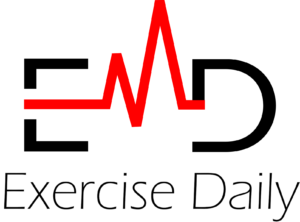Table of Contents
Exercise Daily – Becoming a new mom is an incredible journey filled with joy and challenges. One of the common concerns for many new mothers is post-pregnancy weight gain. You might be eager to shed those extra pounds, but doing it healthily and sustainably is essential. This guide will explore effective strategies for losing weight after pregnancy and maintaining your new physique.
Setting Realistic Goals
Setting realistic weight loss goals after pregnancy is the foundation of a successful journey. It’s crucial to be mindful of the unique challenges and changes your body has undergone during pregnancy. Here, we’ll delve deeper into the process of setting achievable and realistic goals for your post-pregnancy weight loss journey.
1. Understanding Your Unique Journey
First and foremost, recognize that your weight loss journey is unlike anyone else’s. Your body, health, and circumstances are distinct, so avoid comparing yourself to others, especially celebrities who might seem to bounce back effortlessly. Embrace your uniqueness, and remember that slow and steady progress is key.
2. Gradual Progress
Post-pregnancy weight loss is not a race. Aim for gradual progress instead of rapid results. Losing weight too quickly can be unhealthy and lead to muscle loss or nutritional deficiencies. Your primary focus should be on long-term health and well-being rather than trying to fit into your pre-pregnancy jeans overnight.
3. Realistic Timeframes
Setting a reasonable timeframe for your weight loss goals is essential. Understand that it took nine months to create the baby bump, so it’s entirely normal for it to take several months to shed the extra weight healthily. Consult with your healthcare provider to determine a suitable timeline based on your circumstances.
4. Health and Well-being over Numbers
While it’s common to have a target weight in mind, prioritize your overall health and well-being over the number on the scale. Aim to feel stronger, more energetic, and confident in your body. Focus on adopting a balanced lifestyle that includes nutritious eating and regular physical activity.
5. Small, Achievable Milestones
Breaking your weight loss journey into small, achievable milestones can be incredibly motivating. Celebrate each mini-success along the way rather than fixating on the end goal. Whether losing the first five pounds or completing a fitness milestone, these victories motivate you.
6. Adjusting Goals as Needed
Flexibility is key when setting post-pregnancy weight loss goals. Life as a new mom is unpredictable, and you may encounter unforeseen challenges. Be prepared to adjust your goals as needed without feeling discouraged. The ability to adapt to changing circumstances is a significant part of success.
7. Seeking Professional Guidance
Consider consulting a healthcare provider or a registered dietitian to help set realistic goals. They can provide personalized guidance based on your health history and needs, ensuring your goals align with your overall well-being.

Nutrition Tips for Post-Pregnancy Weight Loss
Proper nutrition is at the core of any successful post-pregnancy weight loss plan. After giving birth, your body needs essential nutrients to recover and support your baby if you’re breastfeeding.
1. A Balanced Diet is Key
Opt for a nutrient-rich diet to support your recovery and energy levels. Include plenty of fruits, vegetables, lean proteins, whole grains, and low-fat dairy products. These foods provide essential vitamins and minerals while keeping you feeling full and satisfied.
2. Gradual Calorie Reduction
While you may want to shed those extra pounds quickly, avoid extreme calorie-cutting diets. Rapid weight loss can deprive your body of essential nutrients and leave you feeling fatigued. Instead, aim for a gradual calorie reduction, focusing on quality over quantity.
3. Frequent, Small Meals
Eating smaller, more frequent meals throughout the day can help regulate blood sugar levels and prevent overeating. It also keeps your metabolism active, aiding in weight loss. Include healthy snacks like yogurt, nuts, or fresh fruit to curb hunger between meals.
4. Hydration is Vital
Staying hydrated is crucial for weight loss. Often, thirst is mistaken for hunger, leading to unnecessary snacking. Carry a reusable water bottle with you and sip throughout the day. Water also aids digestion and helps flush out toxins from your body.
5. Mindful Eating
Mindful eating involves paying attention to your food, savoring each bite, and recognizing when you’re full. This practice can prevent overeating and promote healthier food choices. Turn off distractions like TV or phones while eating to enjoy your meals fully.
6. Breastfeeding and Nutrition
If you’re breastfeeding, your nutritional needs are even higher. Focus on nutrient-dense foods to provide you and your baby the necessary vitamins and minerals. Consult a lactation consultant or dietitian for personalized guidance.
7. Control Portions
Even when eating nutritious foods, portion control is essential. Use smaller plates to help control portion sizes, and listen to your body’s hunger cues. Avoid eating out of boredom or stress, and stop when you’re satisfied, not overly full.
8. Meal Prep and Planning
Planning your meals can prevent impulsive, unhealthy food choices. Set aside time each week for meal prep and create a menu that includes a variety of balanced meals. Having healthy options readily available makes it easier to stick to your goals.
9. Avoid Processed Foods
Processed foods are often high in unhealthy fats, sugars, and preservatives. Minimize your intake of processed snacks, sugary beverages, and fast food. These items can hinder your weight loss progress and provide little nutritional value.
10. Seek Professional Guidance
For personalized nutrition advice, consider consulting a registered dietitian. They can assess your dietary needs, recommend specific foods, and create a meal plan tailored to your weight loss goals and lifestyle.

Crafting a Safe and Effective Exercise Routine
Returning to an exercise routine after pregnancy is a significant step towards post-pregnancy weight loss and overall well-being. However, it’s crucial to approach exercise with care and safety, especially as a new mom.
1. Consult Your Healthcare Provider
Before beginning any exercise routine, consult your healthcare provider. This is especially important if you had a C-section or experienced any complications during pregnancy. Your healthcare provider can assess your situation and provide specific guidelines for safe exercise.
2. Gradual Start
Your body has undergone significant changes during pregnancy, and it’s essential to ease into exercise gradually. Start with low-impact activities like walking or gentle yoga. As your strength and stamina improve, you can incorporate more intense workouts.
3. Strength Training
Strength training is an excellent way to build lean muscle, boost metabolism, and tone your body. Focus on exercises that target major muscle groups, such as squats, lunges, and push-ups. Start with light weights or resistance bands and increase as you get stronger.
4. Cardiovascular Exercise
Cardiovascular exercise helps burn calories and improve cardiovascular health. Swimming, cycling, and brisk walking are ideal for new moms. Aim for at least 150 minutes of moderate-intensity cardio per week, gradually increasing the duration.
5. Core and Pelvic Floor Exercises
Pregnancy can weaken your core and pelvic floor muscles. Incorporate exercises like pelvic tilts, Kegels, and planks to strengthen these areas. A strong core and pelvic floor are essential for post-pregnancy recovery and preventing back pain.
6. Posture and Alignment
Maintaining good posture and alignment is crucial during and after pregnancy. Pay attention to your body’s positioning during exercises to avoid straining your back or joints. Consider taking classes or working with a trainer to ensure proper form.
7. Listen to Your Body
Pay close attention to how your body feels during and after exercise. If you experience pain, dizziness, or excessive fatigue, stop immediately. Rest when needed, and don’t push yourself too hard. Post-pregnancy workouts should be challenging but not overwhelming.
8. Flexibility and Stretching
Include stretching exercises in your routine to improve flexibility and prevent muscle tightness. Yoga and gentle stretching can also promote relaxation and reduce stress.

Breastfeeding Benefits
Breastfeeding benefits your baby’s health and offers advantages regarding post-pregnancy weight loss.
1. Uterine Contraction
Breastfeeding triggers uterine contractions, helping your uterus return to its pre-pregnancy size more quickly. These contractions support your body’s recovery and contribute to a flatter belly.
2. Hormone Regulation
Breastfeeding promotes the release of oxytocin, a hormone that encourages bonding with your baby and helps your body recover after childbirth. This hormone also plays a role in reducing stress and emotional eating, making it easier to manage your weight.
3. Appetite Control
Breastfeeding mothers often experience a sense of fullness and satiety after nursing. This natural appetite control can reduce overeating and help you make healthier food choices.
4. Nutrient Transfer
Breast milk provides essential nutrients and antibodies to your baby, promoting their growth and health. As your body produces milk, it draws on fat stores, contributing to weight loss.
5. Emotional Benefits
The act of breastfeeding and the bonding it fosters can positively impact your emotional well-being. Reduced stress levels and a stronger connection with your baby can help prevent emotional eating and support your weight loss journey.
6. Postpartum Depression
Breastfeeding has been linked to a reduced risk of postpartum depression. Maintaining good mental health is essential for sticking to your weight loss goals and maintaining a healthy lifestyle.
7. Custom Nutrition
Breast milk is uniquely tailored to meet your baby’s nutritional needs. It adapts to your baby’s age and growth, providing the best possible start in life.
8. Convenience
Breastfeeding is convenient and portable, allowing you to feed your baby anywhere. This flexibility makes it easier to stick to your weight loss goals without feeling tied to the kitchen.
Sleep and Stress
Balancing the demands of a new baby, household chores, and personal care can be overwhelming for new moms. However, prioritizing sleep and stress management is crucial for your well-being and successful post-pregnancy weight loss.
1. Quality Sleep is Essential
Quality sleep is your body’s natural way of recovering and rejuvenating. Lack of sleep can lead to weight gain by disrupting hunger-regulating hormones and increasing cravings for high-calorie foods. Aim for 7-9 hours of uninterrupted sleep each night, even if it means taking short naps during the day when your baby sleeps.
2. Establish a Sleep Routine
Babies thrive on routines, and so do adults. Establish a regular sleep schedule by going to bed and waking up at the same time each day. This consistency helps regulate your body’s internal clock and improves the quality of your sleep.
3. Sleep When the Baby Sleeps
Naptime is your opportunity to catch up on sleep. Whenever your baby naps during the day, consider joining them for a short rest. Avoid using this time for household chores or other tasks; prioritize your well-being.
4. Stress Management Techniques
Stress can lead to emotional eating and weight gain. Incorporate stress-relief techniques into your daily routine, such as meditation, deep breathing exercises, or yoga. These practices can help you manage and prevent stress from derailing your weight loss efforts.
5. Support System
Don’t be afraid to ask for help or accept offers of assistance from friends and family. A strong support system can ease the demands of new motherhood, allowing you to prioritize self-care, including getting enough sleep and managing stress.
6. Time Management
Efficiently managing your time can reduce stress and create pockets of opportunity for self-care. Create a daily schedule that includes time for exercise, relaxation, and healthy meal preparation. Prioritize these activities as you would any other responsibility.

Hydration
Staying hydrated is essential for overall health and weight loss. Water helps control hunger and aids in digestion. Carry a water bottle throughout the day to remind yourself to drink enough fluids.
Patience and Consistency
Remember that post-pregnancy weight loss is a marathon, not a sprint. Be patient with yourself, and stay consistent with your healthy habits. Small, consistent efforts will lead to significant results over time.
Seeking Support
Losing weight is more achievable with a support system. Connect with other new moms on a similar journey, join support groups, or involve your partner in your goals. Having a support system can keep you motivated and accountable.
Postpartum Supplements
Consult your healthcare provider about postpartum supplements. They can recommend essential vitamins and minerals for your recovery and post-pregnancy health. After giving birth, your body goes through various changes, and you may have unique nutritional needs. Postpartum supplements can play a vital role in supporting your recovery and overall health during this critical period.
Track Progress
Track your progress to stay motivated. Take photos, keep a journal, or use a fitness app to record your achievements. Celebrate small victories along the way. Tracking your post-pregnancy weight loss progress is crucial to staying motivated and accountable on your journey to a healthier you. You can work towards your goals effectively by monitoring your achievements and adjusting as needed.
Body Positivity
It’s essential to embrace your post-pregnancy body throughout your weight loss journey. Your body has accomplished an incredible feat; every scar and stretch mark tells a unique story. Practice self-love and body positivity. After pregnancy, your body goes through significant changes, and it’s essential to approach these changes with love, acceptance, and body positivity. Embracing your post-pregnancy body is a powerful step towards self-confidence and overall well-being.
Dealing with Plateaus
Plateaus are a common part of any weight loss journey. When you hit a plateau, don’t be discouraged. Review your diet and exercise routine, and make necessary adjustments. Plateaus are temporary, and with persistence, you’ll break through.
Avoiding Crash Diets
Crash diets promise quick results but often lead to muscle loss and nutritional deficiencies. Avoid extreme diets and focus on sustainable changes to your eating habits. Your long-term health is more important than rapid weight loss.
Conclusion
Losing weight after pregnancy is a gradual process that requires patience, dedication, and self-love. Remember that your journey is unique, and there’s no one-size-fits-all approach. Set realistic goals, prioritize nutrition and exercise, seek support, and embrace your post-pregnancy body. With time and persistence, you can achieve your weight loss goals while maintaining your health and well-being.
FAQs – How to Lose Weight and Keep It Off After Pregnancy
Q: Is it safe to start exercising right after giving birth?
It’s essential to consult your healthcare provider before starting any exercise routine. They can assess your situation and guide you on when it’s safe to begin.
Q: Can I lose weight while breastfeeding?
Yes, breastfeeding can help with weight loss, but it’s crucial to maintain a balanced diet to ensure you and your baby get the necessary nutrients.
Q: How long does it typically take to lose post-pregnancy weight?
The timeline varies from person to person. Focusing on gradual, sustainable weight loss rather than a specific timeline is essential.
Q: What are some stress management techniques for new moms?
Stress management techniques include deep breathing, meditation, yoga, and seeking support from friends and family.
Q: Are there any specific exercises to target post-pregnancy belly fat?
Core-strengthening exercises like pelvic tilts and planks can help target post-pregnancy belly fat, but consult a fitness trainer for a personalized plan.






